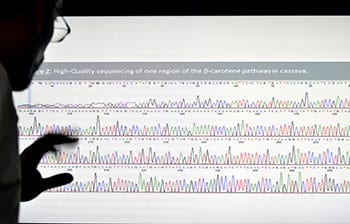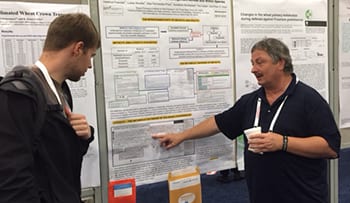News
BTI at Plant and Animal Genome Conference
A large contingent of researchers from the Boyce Thompson Institute attended the twenty third annual Plant & Animal Genome Conference this year, some attending for the tenth time.
Each year in mid-January, thousands of scientists flock to PAG. They don’t come for the location – though who can complain about San Diego in January? – and some don’t even come for the talks. Many see the meeting as a reunion where they can see colleagues and cultivate new collaborations.
“Every plant or animal community comes to this meeting,” said Surya Saha, a postdoctoral researcher in the lab of Associate Professor Lukas Mueller. “It becomes a large meeting of small groups.”
At PAG, Mueller, Saha, and labmates Susan Strickler and Isaak Tecle taught a workshop on the tools available to the research community and to breeders through their Sol Genomics Network. The database allows researchers to access the genomes of Solanaceae plants such as tomato, potato and eggplant.
“PAG is where SGN meets all its users,” said Saha. “We essentially talk about new features on the website, new datasets, any new tools we have added.”
Saha presented his newest version of the tomato genome at the workshop. Though the sequence is already considered to be finished, there are still a few holes that he is trying to fill in with large hunks of DNA sequences held in artificially constructed chromosomes. For some of these gaps he knows how much the genome sequence is missing, but in others, he’s still trying to figure out “how wide the hole is.”
Tecle, a bioinformatics consultant in the Mueller lab, presented their new web-based genomic selection tool, called solGS, as part of the SGN workshop. Breeders can use the solGS tool to predict performance of plants, based solely on their genetic data and without doing field evaluation.. “It can easily be adapted to any crop,” he said, noting that the tool could theoretically also be used for animal breeding and is free and open source. He estimates that up to 40 people attended the workshop.
“When you’re sequencing you get all these little pieces and somehow you have to stick them back together like a puzzle,” said Strickler. Many of these little pieces come from stretches of repeated DNA sequences, so putting together the coffee genome is a little bit like putting together a puzzle that is mostly the same color.
Strickler is not much of a coffee drinker herself, but despite the challenges, she is interested to see how the coffee genome differs from the genomes of its parents.
Hartmut Foerster, a research associate in the Mueller lab also attended PAG and presented his work on MetaCyc , a multi-species database, and SolCyc, a set of databases of Solanaceae plants, which contain information on thousands of metabolic pathways.
Associate Professor Zhangjun Fei’s lab also had a robust presence at the meeting. He presented a talk about the high-quality genome sequences from three important food crops in the gourd family at the Cucurbita workshop. A postdoctoral researcher in his lab, Linyong Mao, also gave a talk on the genome sequence of the Charleston Gray watermelon, and Wenbo Chen, another postdoctoral researcher presented a poster on her draft of the genome of the whitefly. This aphid-like pest causes tremendous damage to crops by feeding on plant sap, but more importantly, by spreading a variety of diseases.
Professor Jim Giovannoni presented his work on the identification of proteins called transcription factors that control how tomatoes ripen.
Though the twenty-fourth annual PAG meeting is still almost a year away, many of this year’s attendees already know they’ll be back.
“I believe we’ll do it again next year,” said Tecle, noting that the SGN workshop continues to bring in a new audience each year, “especially as we develop more tools.”




